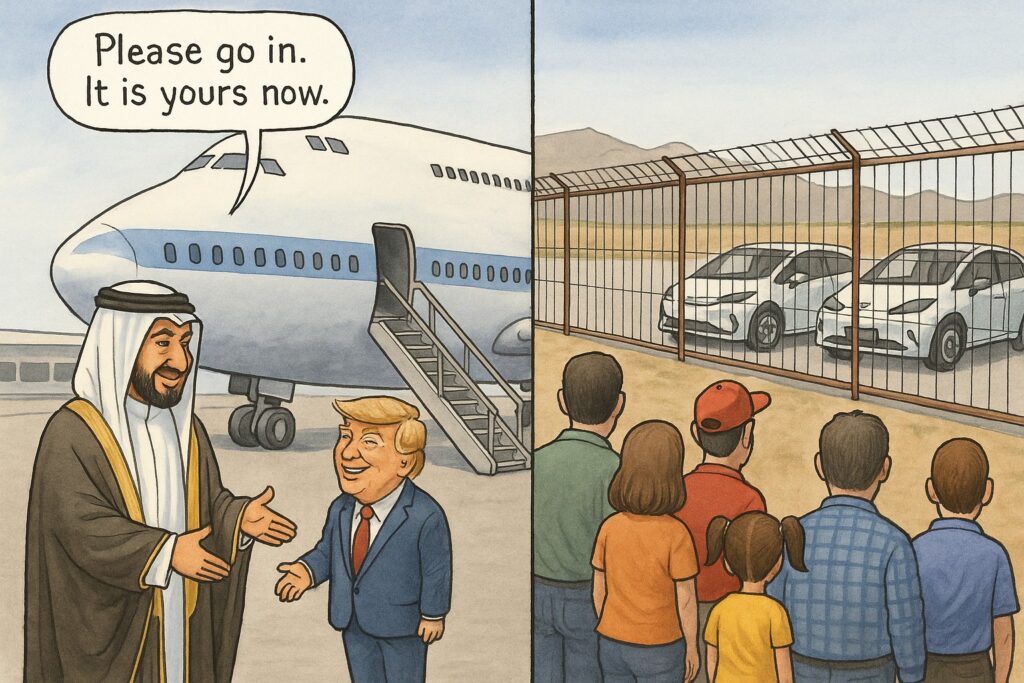Contradictions Can Be Revealing: A Current Example

Expressing a contradiction can show plain ignorance or cognitive impairment. It can also suggest a hypothesis or theory that explains the contradiction away. Consider a current example.
On the one hand, President Donald Trump argued that he would be a fool not to accept from a foreign autocrat the gift of a $400-million airplane (“Republicans Raise Concerns Over Trump’s Plane Gift as He Heads to Qatar,” Wall Street Journal, updated May 14, 2025):
“Only a FOOL would not accept this gift on behalf of our Country,” Trump wrote on his social-media platform. … During an interview with the Fox News host Sean Hannity on Tuesday night, Trump called the proposed gift “a beautiful gesture” and disparaged critics as “stupid.”
On the other hand, Trump denies the American residents’ freedom to import goods produced in China, one reason being that their production is deemed subsidized by the Chinese state. He unilaterally levied very high and often prohibitive tariffs on these goods (he later backed off, but high tariffs remain). One example that Mr. Trump used is dolls, both in his first term and more recently (“Donald Trump’s ‘Marie Antoinette Moment’: Call for National Sacrifice Falls Flat,” Financial Times, May 4, 2025), declaring:
“Maybe the children will have two dolls instead of 30 dolls … and maybe the two dolls will cost a couple of bucks more than they would normally.”
Chinese electric cars offer a similar example. Now very competitive with Teslas, these cars had gained a 50% market share of EVs in the European Union before new import tariffs there reduced it to 30% (“Chinese Carmakers Reset European Ambitions as EU Tariffs Bite,” Financial Times, April 28, 2025). The Seagull produced by BYD should be available in the UK for £18,000 later on this year, which includes compulsory safety upgrades and a 10% tariff (plus the VAT of 20%, a sales tax imposed on all cars sold in the country, domestic or foreign). Were it not for the prohibitive tariffs and non-tariff barriers in the US, the Seagull would cost $24,000 here (at the current exchange rate). Without obstacles from a government that “owns the store,” many ordinary Americans would be likely interested. Perhaps only a (non-rich) fool would not.
BYD is a private company listed in Hong Kong. In 2023, Warren Buffett’s Berkshire Hathaway owned an 8% share. It is subsidized by the Chinese state’s industrial policy, only more interventionist than what the Bidens and the Trumps are fond of. (“How China’s BYD Played Catch-Up with Tesla,” Financial Times, July 6, 2022.)
There is a persuasive moral argument, besides a legal obligation, against purchasing stolen goods. It presumably does not apply to goods subsidized by taxpayers. If it did, there is a large number of goods that one could not purchase, even in one’s own country. In the case of dolls and other goods produced by small companies or one-man businesses in China, production subsidies are likely not available.
As for the argument that foreign government subsidies generate “unfair trade,” it is important to understand that free trade remains efficient—even assuming the importer gets no subsidy from his own government. For a group of individuals (say, a “nation”), free trade, like economic freedom in general, means their freedom to trade if they can find a buyer willing to pay their price or if they can find a seller whose price they accept. In a free society, each individual or private organization decides what to buy and from whom. That some competitors will be disappointed is no more a valid objection than the observation that each consumer who buys something implies that another consumer is outbid. In this view, Americans should be free, without special taxes called tariffs or prohibitive tariffs or non-tariff barriers, to import goods from China even if they are subsidized by the hapless Chinese taxpayer. To speak like Mr. Trump, only a fool wouldn’t accept an automobile partly gifted by Chinese taxpayers. (See also my post “Taking Comparative Advantage Seriously”.)
A country where public officials could accept and even chase possibly corrupting gifts from foreign autocrats, but where private individuals could not accept gifts through trade, looks like a free society upside down.
How then can we explain the contradiction voiced by Mr. Trump? Ignorance or cognitive deficit can offer explanations among others. A compulsive liar is bound to be mired in contradictions because he does not remember his previous lies and doesn’t care about the truth anyway. Or perhaps, like Molière’s Mr. Jourdain was doing prose without knowing it, Mr. Trump adheres to solipsism—the philosophy that only one’s own self exists. Another possibility in the present case is the implicit or sometimes explicit pretense of populism: the leader embodies “the people,” and any gift to him is a gift to the people.
******************************

A little contradiction to be explained
econlib





